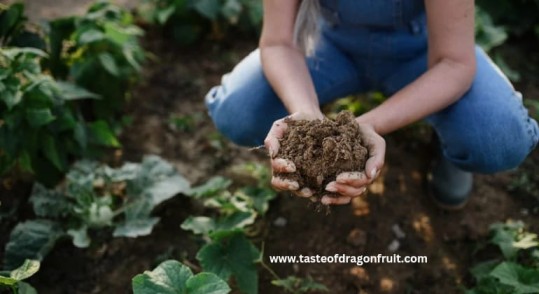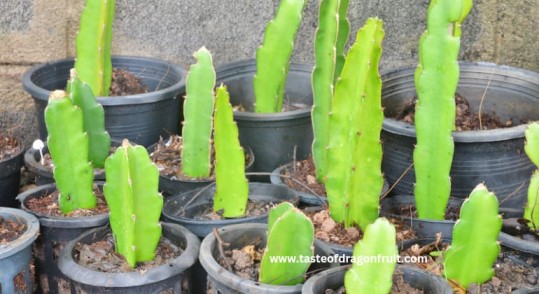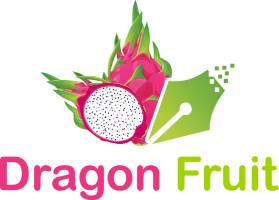Your fast-growing cactus dragon fruit or pithaya (Hylocereus undatus) will need well-maintained soil to grow. Here is a complete guide about the ideal soil conditions for growing a healthy dragon fruit plant. By understanding specific characteristics like pH, texture, organic content, and nutrient levels contribute to its growth you can easily enhance your fruit yield and quality.
What is Optimal Soil Composition For Dragon Fruit?
1. pH Levels Ideal Range: 6.0-7.0 pH
Dragon fruit requires soil within a pH range of 6.0 to 7.0 for optimal nutrient absorption and growth. Studies indicate that 82% of dragon fruit plants thrive in soils with this pH range. Soils with pH levels outside 5.5 to 7.5 can lead to a 40% reduction in nutrient uptake. It will be stunting dragon fruit plant growth and fruit production.
2. Soil Texture
A loamy sand texture is the ideal soil composition for dragon fruit. It provides a balance of drainage and aeration to plants.
60% sand, 20% silt, and 20% clay is the preferred mix!
This combination ensures:
- Optimal water retention without waterlogging.
- Sufficient aeration for healthy root systems.
- Enhanced root development for vigorous plant growth.
3. Organic Matter Content of Soil
Dragon fruit plants benefit from soils rich in organic matter. Organic matters improve both soil fertility and structure.
Recommended organic matter content in soil for Dragon fruit is 3-5%
Research indicates a 27% increase in fruit yield when soil maintains organic matter within this range. Common organic amendments include:
- Compost
- Well-rotted manure
- Coconut coir
- Drainage Capabilities
Good drainage is crucial for dragon fruit! They cannot tolerate standing water or water-logging.
Ideal drainage rates for soil for Dragon fruit is 1-2 inches per hour.
Research shows that soils with effective drainage exhibit a 35% higher survival rate for dragon fruit plants. Poorly drained soils can reduce root growth by up to 60%, weakening the plant and leading to lower yields.
What are Nutrient Requirements for Soil For Dragon Fruit?

Dragon fruit requires a balance of key nutrients in the soil to maximize fruit production. The following levels have been identified as optimal for healthy growth:
- Nitrogen (N): 40-60 ppm
- Phosphorus (P): 20-40 ppm
- Potassium (K): 60-100 ppm
- Calcium (Ca): 1000-2000 ppm
Soils that meet these nutrient standards have been shown to increase fruit production by 45%. While the calcium deficiency in soil can reduce fruit quality by as much as 30%, resulting in smaller, less desirable fruits.
How To Make Soil For Dragon Fruit Plants?
Ingredients, you will need:
- Sandy Loam Soil: Ensures good drainage.
- Organic Compost: Enriches the soil with nutrients.
- Perlite or Vermiculite: Improves soil aeration and prevents waterlogging.
- Coco Coir: Enhances water retention while maintaining aeration.
- pH Adjusters (Lime or Sulfur): To maintain a pH range of 6 to 7.
Steps:
- Mix Base Soil by combining 60% sandy loam soil with 20% compost.
- Then add Perlite by mixing in 10% perlite or vermiculite.
- Add 10% coco coir for water retention. Ensuring that it is well mixed.
- Now test the pH of the soil mixture. Adjust it if needed by using lime (to increase pH) or sulfur (to decrease pH).
- You can also add a slow-release, balanced fertilizer for additional nutrients.
Your dragon fruit soil mix should be light, well-draining, and slightly acidic!
Common Soil Issues and Solutions
Here are common soil problems growers face and the most effective solutions:
| Issue | Solution |
| Soil compaction | Amend with coarse sand |
| Poor drainage | Add organic matter |
| Nutrient deficiency | Use balanced fertilization |
Maintenance For Soil for Dragon Fruit

Soil requirements can vary based on regional climate:
Soil for Dragon fruit in Tropical regions: Focus on improving drainage to handle high rainfall (over 2000mm annually)!
Soil for Dragon fruit in Arid regions: Prioritize soil amendments that improve water retention to combat drought conditions.
Soil for Dragon fruit inTemperate regions: Protect plants from frost heaving by mulching and ensuring proper insulation of the root zone.
Bottom Line
Soil health is the foundation for successful dragon fruit cultivation. By maintaining the right pH, organic matter, drainage, and nutrient levels, growers can significantly enhance fruit yield and quality. With the right soil management practices for Dragon Fruit, dragon fruit farming can be a highly profitable and sustainable business and a fruitful addition to your home garden as well!
Want to learn in detail about different rare varieties of Dragon fruits? Explore what is so rare about ‘em here!
FAQs
How to know my soil is over fertilized?
Yellow/Brown leaves are the sign of over fertilized soil.
Can cactus soil be used for Dragon fruit plants?
Yes, as Dragon fruit is a Cactus itself, you can use cactus soil.
What type of soil is best for dragon fruit?
Sandy loam soil with good drainage is ideal for dragon fruit.
How do you improve soil drainage for dragon fruit?
Mix perlite or vermiculite into the soil to enhance drainage.
Can dragon fruit grow in clay soil?
No, clay soil retains too much water and causes root rot. Use sandy soil.
What pH level is suitable for dragon fruit?
Dragon fruit prefers slightly acidic soil with a pH of 6 to 7.
Is organic compost necessary for dragon fruit soil?
Yes, compost enriches the soil with essential nutrients for healthy growth.
Do I need to add fertilizers to the soil?
Adding a balanced slow-release fertilizer can boost growth, but organic compost often suffices.
What is the role of coco coir in dragon fruit soil?
Coco coir helps retain moisture while keeping the soil well-aerated.
How often should I check the pH of dragon fruit soil?
It’s good practice to check the pH every 6 months or when the plant shows signs of stress.






Comments 2